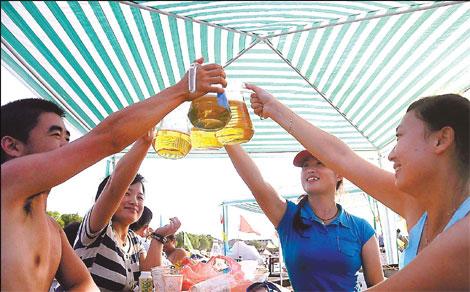
Young people holding a toast at a seaside bar near Beijing. According to World Business Report, beer sales soar in bars and clubs during summer, accounting for 70 percent of the consumption of alcoholic drinks in Beijing's clubs. [China Daily]
Last Friday was a red-letter for Stefan Frank thanks to record sales in his beer garden.
The delighted master brewer at the Paulaner Brauhaus in the Kempinski Hotel Beijing said he had sold the highest volume since he was assigned to China from German brewery Paulaner Brewery seven years ago.
"I was so excited to learn we had sold 200,000 liters of beer by the end of July. That's equal to the total sales volume for all of last year," said Frank.
"Paulaner beer has contributed a lot to the hotel's business this summer and the good sales are mainly as a result of great consumption of beer during the soccer world cup," said Johannes Mayr, director of the food and beverage division at the hotel.
Unlike other foreign beer brands, Paulaner developed its business in China through cooperation with the hotel industry. German hotel chain Kempinski has been the sole agent for Paulaner beer in China since the hotel entered Chinese market in 1982. At present, there are eight Paulaner beer gardens in the country, all of which are located in Kempinski hotels.
"Our cooperation is a win-win strategy because both of us want to insist on the authentic German style in the Chinese market and the German style is especially popular among football fans who came to watch games in our beer garden this summer," said Mayr.
Harbin brewery also saw good sales this summer. On Tuesday, it recorded a 20.7 percent increase in sales volume compared with the same period last year. The brewer reported brand recognition among consumers was three times that of last year.
Zhou Siran, an analyst at China Investment Consulting, said, "The increase in sales volume benefited from the marketing strategy of Harbin brewery during the world cup."
Harbin Brewery's parent company, Anheuser-Busch InBev, one of the largest breweries in the world, spent millions of dollars placing advertisements and holding football activities in South Africa to advertise its products from December last year when the world cup was held.
"Harbin beer is one of the most popular beers in my club where hundreds of football fans came to watch football games during the tournament," said Gao He, manager of Jun club in Beijing.
According to World Business Report, beer sales are always high in bars and clubs during summer, accounting for 70 percent of the consumption of alcohol in Beijing's clubs. Its main consumers include white-collar workers, diplomatic staff and tourists from overseas. There are 500 bars in Beijing mainly located near embassies and the central business district.
A report released by China Alcoholic Drinks Industry Association (CADA) this month showed that China imported 40,500 kiloliters of beer in 2009, 43.9 percent higher than a year earlier. The import price dropped 8.09 percent last year. Xiao Derun, director of the beer department at CADA, said: "Huge demand for high-end beer is enlarging its market share. Its sales outlets are mainly bars and night clubs."
Beers with a volume under 500 milliliters also increased - by 30.8 percent from 2008 to 2009. "Over the next five years, the beer industry will increase from 3 to 5 percent annually, with most being at the high end," said Xiao from CADA.
China is the world's biggest beer producer. Many overseas brewers have entered Chinese market. The world's top 10 foreign beer makers have founded joint-venture enterprises in the country. They produce 60 percent of the total output in China.
Tsingtao is the nation's leading brand. While Snow beer ranks first in terms of gross output and sales, Tsingtao rakes in the highest net profits. According to official statistics, the total output of China's beer production reached 42 million kiloliters in 2009, up at least 1 million kiloliters from 2008.





